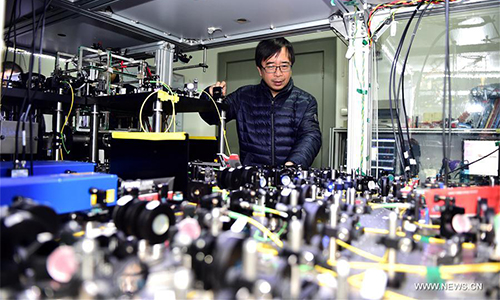Chinese researchers expect quantum leap in computing, challenging Google's supremacy
Source: Global Times Published: 2020/8/26 14:58:42

Pan Jianwei Photo: Xinhua
Chinese quantum computing researchers recently disclosed that a 60-qubit superconductivity quantum computing system with 99.5 percent fidelity could be achieved this year, and in 10 years, the system could evolve into a million-qubit level with a 99.8 percent fidelity, equivalent to, if not better than, its Google counterpart.
Zhu Xiaobo, a professor with the Shanghai-based Institute of Advanced Studies affiliated with University of Science and Technology of China, made the remarks on Tuesday, Shanghai news website Thepaper.cn reported.
The challenges of quantum computing development do not lie in the number of qubit, but it is the operation and control of each qubit that determines how advanced the system is, said Zhu, who is also in charge of the quantum computing work with the research team led by Chinese leading quantum physicist Pan Jianwei,.
US tech giant Google announced a breakthrough in October 2019 - using the company's state-of-the-art quantum computer, called Sycamore, Google has claimed "quantum supremacy" over the most powerful supercomputers in the world by solving problems considered virtually impossible for normal machines.
The Google quantum computer completed the complex computation in 200 seconds. That same calculation would take even the most powerful supercomputers approximately 10,000 years to finish, the team of researchers, led by John Martinis, an experimental physicist at the University of California, Santa Barbara, wrote in their study published in Nature magazine on October 23.
Zhu considered this breakthrough by Google a "really substantial one" in recent years, which is enabled by a 53-qubit superconductivity system with a 99.4 percent fidelity.
In quantum mechanics, notably in quantum information theory, fidelity is a measure of the "closeness" of two quantum states. It expresses the probability that one state will pass a test to identify as the other.
Zhu revealed that his team is close to achieving a 60-qubit quantum computer, seeking to catch up with and even surpass Google.
Zhu hopes that in 10 to 15 years, quantum computers can be used to solve real problems in the field of cryptology, rather than being used only to demonstrate their computing capabilities, which is the case for current models.
When the number of qubit reaches 100, and the computing system's fidelity reaches 99 percent, it can dwarf classical computers, he noted.
When a quantum computer is put into practical use, it will mainly play the role of a server. Users can upload their problems to the cloud and let the server work on them, Zhu said.
Pan's team declined to give further details of their studies when reached by the Global Times on Wednesday.
Global Times
RELATED ARTICLES:
Posted in: SOCIETY